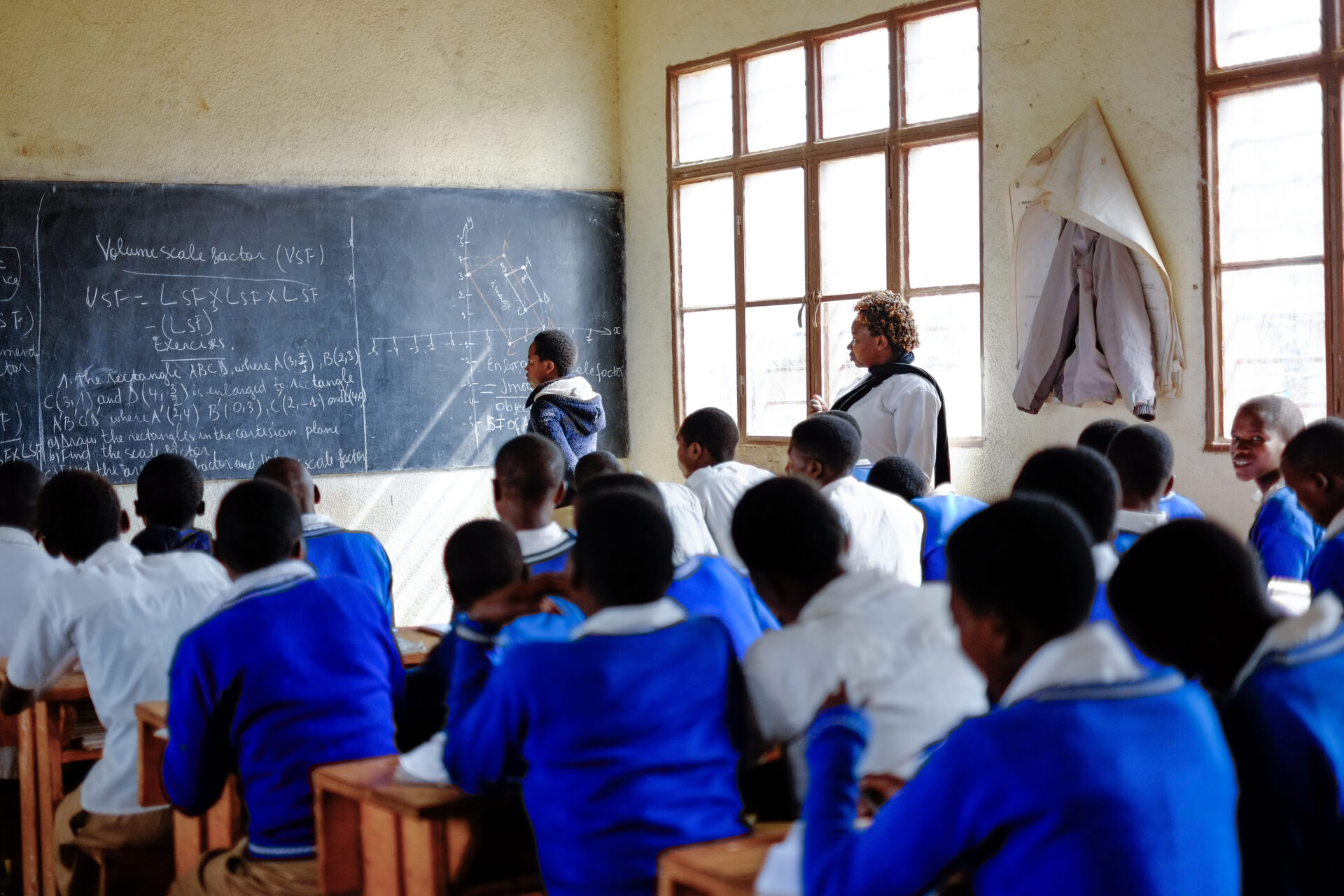This blog was written by Laterite and the Research for Equitable Access and Learning (REAL) Centre at the University of Cambridge and highlights findings from five years of research for the Mastercard Foundation’s Leaders in Teaching programme.
Research carried out in 355 secondary schools in 14 districts of Rwanda between 2020 and 2023 has repeatedly shown that more disadvantaged students achieve lower mathematics scores than their more advantaged peers. Disadvantaged students often refer to girls, students who are older than expected for their grade, students in non-selective regular schools, students with a disability, and students from poorer households.
Five years of research as part of the Leaders in Teaching programme has revealed clues as to which policies help to reduce this disadvantage to ultimately decrease the STEM learning gap in Rwanda.
Attract more female teachers to the profession
Schools with a higher proportion of female teachers showed smaller gaps between girls and boys in STEM learning outcomes. This might relate to a ‘role model effect’. Additionally, our research revealed that female teachers were more likely to acknowledge girls’ strengths in STEM learning compared to boys. This suggests that efforts to attract more female teachers might help narrow the learning gap between boys and girls.
Teachers recommended some ways to attract more females to the profession:
- Place teachers in schools close to where they live, enabling them to better balance work and household responsibilities
- Schedule continuous professional development (CPD) at times that do not conflict with family responsibilities
- Implement policies that support female teachers’ work-life balance, such as providing breastfeeding rooms and flexible working hours
Focus teacher CPD on knowledge of the subjects they teach
We looked at the association between student learning and three measures of teaching quality:

Higher teacher knowledge of mathematics is associated with improved student mathematics learning outcomes between 2020 and 2022. This shows that improvement in teachers’ knowledge of the subjects they teach could close the achievement gap in Rwandan schools.
We didn’t find associations between student mathematics learning outcomes and the other two indicators of teaching quality. This suggests the need to re-evaluate the content and delivery of CPD programmes so that teachers can get the most benefit from them.
Rwandan secondary teachers recommended some ways to improve CPD provision:
- Conduct needs assessments to tailor CPD topics to identified needs and interests
- Provide certificates for CPD training that hold value for career progression
- Regularly meet with CPD providers to coordinate CPD content around the curriculum, and classroom and teacher needs
- Establish feedback mechanisms for teachers to share their experiences and suggest improvements for CPD programmes
Targeted and continuous support for students from disadvantaged backgrounds
Rwandan Secondary 3 students’ mathematics learning outcomes significantly improved between 2020 and 2022 on average. This is despite school closures due to the COVID-19 pandemic.
Students from disadvantaged backgrounds, including girls, overage students, and those in less selective regular schools scored lower in mathematics compared to their peers. However, these same students also showed greater improvement in mathematics learning outcomes over the same two-year period.

This provides the encouraging evidence that focusing teacher training initiatives and school infrastructure improvements on less advantaged schools and students reaps rewards in terms of narrowing the achievement gap between more and less advantaged students.
Teachers recommended some ways to support inclusive learning:
- Train teachers on gender-inclusive education, and ensure that every school has facilities such as well-equipped girls’ rooms which can be used during their menstruation
- Encourage equal participation in classroom discussions and leadership roles
- Invite successful women in STEM to visit students as role models to build confidence
- Engage parents in discussions about the importance of equal education for girls and boys
- Increase funding for regular schools to provide laboratories and ICT equipment, or organise study trips to Schools of Excellence for science practicals
- Provide specialised training to teachers to support diverse children to thrive in their education environments
Teacher motivation plays a key role in educational achievement
Teachers with higher intrinsic motivation – genuine interest and enjoyment in being a teacher – were more likely to have students with higher mathematics achievement. Teachers whose motivation was negatively affected by systemic factors – such as a lack of resources in the classroom, a lack of preparation time, and large class sizes – were more likely to have students with lower achievement in mathematics.
These findings highlight the complex dynamics of teacher motivation and its critical role in educational achievement, specifically in closing the STEM learning gap in Rwanda. They suggest that enhancing teacher motivation and alleviating systemic constraints might improve student learning outcomes.
Teachers recommended some ways to increase teacher motivation:
- Engage teachers in decision-making to make them more invested in the school’s success
- Establish mentorship programmes to connect new and experienced teachers
- Give teachers more time for lesson preparation and professional development
- Provide daycare facilities for working parents
- Ensure schools have adequate teaching materials and resources and teachers are trained on how to use them in the classroom
- Align salary increments with additional training and certification
Learn more about the research in the 2024 learning synthesis (English, Kinyarwanda), read more of the teachers’ recommendations in the 2024 teacher voices note (English, Kinyarwanda) and read the summary of key actions from our Leaders in Teaching closeout event.
Laterite and the REAL Centre at the University of Cambridge were learning partners for the Mastercard Foundation’s Leaders in Teaching, an initiative to improve teaching and learning quality in Rwandan secondary education with a focus on STEM.
All research publications are available on the Laterite and REAL Centre websites.
